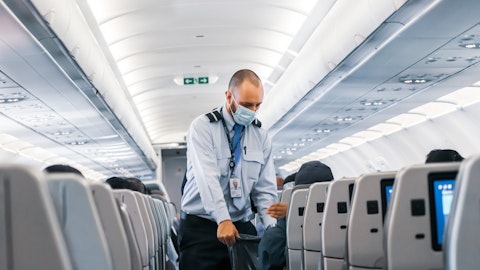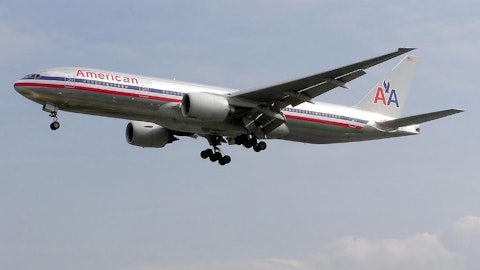And some of those customers, by the way, flying United Airlines for business and sometimes the same customers fly on United for leisure, vacation or other needs. And so, they have that optionality to purchase anything from Basic Economy to Polaris as part of that. And if they join MileagePlus, they have obviously a larger chance to get upgraded into our large premium economy sections or into our first class cabins, which are growing. So that diverse set of revenue streams. I know others — I know it sounds complicated, but it is our secret recipe. It is what the market wants. It’s what our customers want. And we are not trying to be all things to all people. We’re trying to make sure for the customers that fly United that they have a range of product choices for the particular trip they’re going to take on that journey.
Scott Kirby: And I would say it as — it is more complicated. You’re right. It’s simpler if you’re going to only try to appeal to one niche. But the niches are small. The number of markets that exist that you can only be a low-fare, low-cost commoditized player is — the number one market that exists, but you can only be a premium airline is even smaller. And so, they’re just tiny niches, and we’re a big airline.
Mike Leskinen: I’ll just pile on. We fly 200 million passengers annually. And those passengers fly for different reasons, and they — and the passengers will shift from leisure to business passengers throughout their life. And so it is important that we serve all of them and we serve all of them with a product that suits their needs.
Ravi Shanker: That’s very helpful color. Thank you for that. And maybe as a quick follow-up, and apologies if I missed this earlier. There is some speculation about us potentially being at peak international right now, specifically peak transatlantic. What would you say to that kind of going into 2024, kind of do you see enough runway? I think you said in the coming out of the summer of 2022 that 2023 would be a lot bigger and kind of had that visibility? Are you confident that that strength can continue in 2024 as well?
Andrew Nocella: Well, I’d say right now, particularly today, for example, we continue to see strength across Atlantic. We particularly see it to Southern Europe, I can tell the industry does by all of our changes, and that’s great to see. So we think that the trends are going to continue. That being said, I did say earlier in my comments that we are going to give the Atlantic a rest. We’ve run a lot since 2019 for sure. And this year, it will be a year of basically no capacity growth across the Atlantic. I said I wasn’t going to give capacity guidance, but clearly, that’s a big hint for a big part of the airline. So, sorry, Mike. And the other thing I’ve said is like the last part of the world to recover is Asia.
And Asia is still, however you want to look at it, very strong, we’re growing a lot of capacity on the front. And we’re going to focus our efforts where we see that growth, where we see the profitability opportunity. And if you look at our schedules going into next year, you can see that a gigantic percent change in our capacity is, in fact, Asia. So, we put the capacity where we think we need to put it. We’re really bullish on international. We come a long way. It’s very profitable. And there’s a lot more to come. And as I said, in the latter part of this decade, I think we’ll lean into it even further. We have the right hubs, right gateways where we have the leading business demand, the leading leisure demand and the leading cargo demand.
And that recipe is just unique to United, and we’re going to take full advantage of it.
Mike Leskinen: I spoke to an earlier question around the — I spoke to an earlier question around the constraints to industry capacity. And there’s nowhere that that’s more true than for widebody aircraft. In addition to that, as Andrew alluded to, but I’ll just emphasize, we have the best international gateways leaving the United States of any carrier. And so this is where, as Andrew says, we were born on third base, and we’re going to capitalize on that.
Operator: Our next question comes from Scott Group with Wolfe Research.
Scott Group: So Scott, yesterday, you said that adjustments are inevitable and you expect them by the second half of ‘24. I guess, I’m wondering what — are you just talking about there are going to be capacity cuts by the second half next year? Are you talking about something bigger than that? And then, when — yes, go ahead.
Scott Kirby: Well, I’m not going to predict what the exact changes are going to be, but here’s what I’d say. There’s been a structural change in the industry. And the structural changes I’ve hinted at this earlier in today’s call. I don’t think air travel is a commodity. Some in the industry think it is, I do not. I think product service experience matter. Everything we’ve been doing in the last three years has been focused on improving that for our customers. That’s true across the board, from the premium, but all the way down to the Basic Economy customers, and particularly as it pertains to low-cost carriers. I think there’s three things that we have done that have completely changed the competitive dynamics there.
First, as we’re growing with higher gauge, we now have low marginal CASMs on those big airplanes. We used to try to compete with them with regional jets, we couldn’t compete. We had a high-cost product and we ran out of seat. We now have seats to sell on low marginal CASM on big growing airplane. Second is Basic Economy. And that is a product that is where we can be price competitive but offer a far superior product still than you can get on a low-cost carrier and still be price competitive. And the third is the pivot into leisure markets. We’ve added more capacity and it’s done really well when we’ve added capacity into leisure market. And you put those three things together. And what we’ve tried to do is create a product that customers will choose.
And so, what we try to do is create a cost-competitive product for customers but that is better, and so they will choose to fly United. And that is exactly what we’ve done. That’s why I see us have — two airlines have 98% of the revenue growth. And that makes it hard if you’re someone else. I’m not going to predict what is going to — what they have to do. But if I was at one of those airlines, I’d be really worried about not having a competitive product with United Airlines. That’s the issue.
Scott Group: It strikes me, I don’t think I’ve heard you talk so much and then so positively about Basic Economy in a while. It feels like a change in tone or strategy. Can you just talk about that and why it’s happening now? Is it reflective of the competitive dynamic, the demand environment? Just feels like a change.





